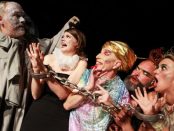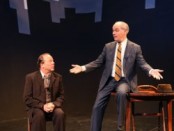Bashevis’s Demons: 3 Tales by Isaac Bashevis Singer
Typical of Singer stories about 19th century Polish Jewry, these three dramatizations combine Jewish mysticism and demonology with Baker as the narrator of two of the stories while also playing the demons in both (“The Mirror” and “The Last Demon.”) The third story published in English as “Cockadoodledoo” but here renamed “Thus Spake the Rooster” is performed by Seigel in two parts as the title character who seems to have supernatural powers. The evening is both directed and designed by Moshe Yassur and Beate Hein Bennett, both of whom worked on the Yiddish versions of Waiting for Godot and Death of a Salesman seen in New York under the auspices of The New Yiddish Rep. [more]







